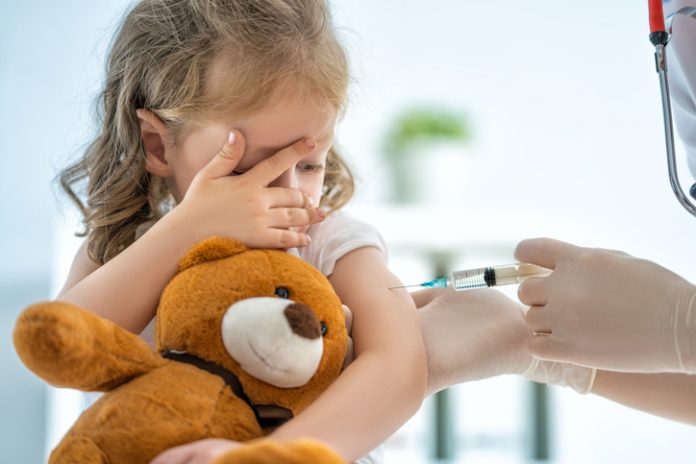The U.S. Food and Drug Administration (FDA) has granted emergency use authorization for mRNA coronavirus injections for children aged six months and older, making the United States the only nation to approve them for children under five.
On June 17, the FDA recommended both the Pfizer-BioNTech and Moderna shots be administered to infants and toddlers. Previously, the shots were recommended for ages five and up.
The FDA took this action based on a unanimous recommendation from an advisory panel, despite incomplete efficacy data. The Centers for Disease Control (CDC) followed with its approval on June 18, making the 17 million U.S. children under age five eligible for the injections.
Efficacy Questions
Pfizer and Moderna, the two pharma giants that manufactured most of the shots available to Americans, conducted efficacy trials before getting their products authorized by the federal government.
Moderna’s reported estimates for efficacy in children ages six to 23 months were at 51 percent for a two-dose series. Pfizer’s two-dose series did not register an immune response by the FDA’s definition, leading the agency to delay its evaluation until a three-dose test was available.
Serious Doubts
When Pfizer estimated an 80 percent efficacy for three doses of its mRNA injections for young children, CDC advisers called that estimate unreliable. The estimate was based on a group of only 10 children, three of whom received a placebo.
“That 80 percent figure for efficacy you’ve seen reported is worse than a joke, it’s essentially a fabrication,” independent journalist Alex Berenson wrote on his “Unreported Truths” blog after the announcement.
“Here’s what the Food and Drug Administration and Pfizer did; they only counted cases after the THIRD mRNA dose,” Berenson writes. “But of the 375 Sars-Cov-2 infections in the trial, 365 occurred before the third dose. Only 10 occurred after the third dose” (emphasis in original).
That means Pfizer based its efficacy figure on less than 3 percent of all the infections recorded in the trial.
Big Differences
Pfizer first received emergency use authorization for its COVID-19 shots after it announced on November 9, 2020, that the shots were 90 percent effective seven days after the second dose. The trial involved 43,538 participants.
The trials for infants and toddlers were markedly different, writes Berenson.
“Count the other 97 percent of the infections, and the vaccine was roughly 20 percent effective over the entire trial—far, far below what the FDA said was approvable in 2020,” Berenson writes.
The confidence intervals in the Pfizer study were below zero for children two and under, so “the possibility that the vaccine increased the risk of infection cannot be excluded,” Berenson writes (emphasis in original).
Children have long been considered to be at low risk of COVID-19 mortality. In addition, in February 2022 the CDC acknowledged natural immunity is superior to the protection the coronavirus shots provide.
Trial Errors
Jane Orient, M.D., executive director of the Association of American Physicians and Surgeons and a policy advisor to The Heartland Institute, which co-publishes Health Care News, discussed the trial evidence on June 23 with Health Care News managing editor AnneMarie Schieber for the Heartland Daily Podcast.
“The [Pfizer] trial was a disgrace from a scientific standpoint,” said Orient. “Supposedly they were going to have something like 3,000 kids in each group [control, test], but they only ended up checking the antibody levels in 10 percent of the participants,” said Orient.
“So they have no idea what the antibody levels were in the others,” said Orient. “In general, kids in this age group, already 75 percent of them probably do have antibodies because they had COVID and it was probably not apparent. What is the emergency?”
According to the CDC, 75 percent of children under 18, and more than half of U.S. citizens overall, have antibodies for COVID-19.
Orient says the high number of children dropping out of the trial is unusual.
“That ought to really disqualify it from serious consideration,” said Orient.
Foregone Conclusion
Instead of the trial providing sufficient evidence to justify approving the injections, it was used to support a decision the government had already made, says Orient.
“I think what the trial did was to put a rubber stamp on a conclusion that had already been reached,” Orient said. “The government had already paid for 100 million doses or so of the vaccine. Doctors were already being told by medical societies how to get supplies so they could start jabbing kids the instant this decision came down.”
Even though experts testified against giving the shots to young children, “the supposed expert committee members all voted in favor of it, and then the FDA with warp speed and the CDC after that put their rubber stamp on it,” said Orient.
Widespread Resistance
Florida Gov. Ron DeSantis said his state would resist the federal agencies’ decision, speaking at a June 16 news conference.
“We are not going to have any [state] programs where we’re trying to jab six-month-old babies with mRNA,” said DeSantis. “That’s just the reality.”
Florida-based grocery store chain Publix, which offered coronavirus shots during the pandemic, is refusing to administer the shots to children under five.
Less than 30 percent of children ages five to 11 nationwide have received the full sequence of COVID-19 injections, according to the CDC.
A survey by the Kaiser Family Foundation found less than one-fifth of parents of children younger than five would be eager to vaccinate them immediately. Almost 40 percent of parents said they would take a wait-and-see approach, and about the same percentage said they would decline or only get their child vaccinated if required.
A campaign aimed at children to encourage the shots, featuring Elmo and his Muppet dad, Louie, was recently launched by the nonprofit educational organization Sesame Workshop.
Harry Painter (harry@harrypainter.com) writes from Oklahoma.
For more great content from Health Care News.





















